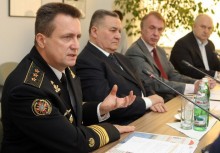Alarmingly, Russia continues to amass troops at the border with Ukraine, as most combat-ready formations of the Russian Armed Forces keep arriving there. Still, the Kremlin continues to claim that no one is going to fight. Americans report the danger, too. The US military intelligence told Congress on March 27 that the likelihood of military intervention in eastern Ukraine was higher than thought before. US experts expect attacks on Luhansk, Donetsk, and Kharkiv as well as assault from Transnistria into southern Ukraine.
What does it mean? Is the Kremlin, buoyed by the successful completion of the first phase of its special operation aiming to annex Crimea, moving to the second phase? What are the threats to Ukraine? Have we learned from the Crimean debacle? How should our country respond to these threatening trends? These questions today concern us all. War (God forbid) never benefited anyone, bringing only chaos and misery. Guests of The Day’s roundtable “Temperature of Today: Diagnosis and Prescription” looked for answers to acute problems of the present.
The roundtable involved high-level experts on security and defense who had visited the NATO headquarters in Brussels at the alliance’s invitation on March 24 to discuss the current situation in Ukraine and the subsequent action plan. The roundtable discussed the main implications for government and society after the annexation of Crimea, new threats to Ukraine, and ways to avoid future mistakes and ensure the nation’s sovereignty.
Yevhen MARCHUK, former prime minister of Ukraine:
“Psychology includes a subdiscipline called victimology. It deals with weakness of one of the participants in the conflict provoking another participant to commit crimes. Not provoking conflict with Russia was the correct course of action before the invasion. Our military balance is weaker. But when the Russians began exercises at our borders, we could reciprocate. When we told one of the NATO leaders that not provoking was less than fully adequate attitude, he frankly told us: ‘Yes, we recommended your leadership to not provoke Russia, but we never told you to not defend yourselves.’ The latest example is CNN’s report from March 27, which cites US intelligence sources. Where is the Ukrainian government’s statement on it? Why is there no reaction?”
Ihor SMESHKO, former head of the Security Service of Ukraine:
“No country has ever made greater contribution to strengthening the defense of the US than Ukraine did when it abandoned nuclear weapons. We have to be realists and understand that external actors will help only those who resist and are ready to show that they can defend themselves. We urgently need to reform the armed forces, and for that, the leadership of the Armed Forces of Ukraine must include high-level professionals. The latest appointment of acting defense minister also surprised me, because, for example, we have an admiral at this roundtable, who is professionally highly relevant now, but the government has had no use for him so far.”







